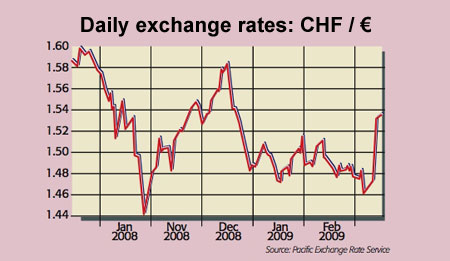
Has Switzerland opened Pandora’s box? John Mauldin on Investorsinsight.com thinks so. Last week the Swiss National Bank forecast the worst recession for Switzerland since 1975. It highlighted the risk of deflation, embraced quantitative easing and, with interest rates already near zero, opted to intervene in the currency markets to lower the value of the franc.
The “super franc” – it has hit record levels against the euro and gained 8% in the past six months – has made exports, which account for half of GDP, more expensive than ever, says Ian Campbell on Breakingviews. That’s working against the central bank’s loose monetary policy, which is aimed partly at making exports cheaper and thus more attractive. Hence its intervention in the currency markets. Sales of francs and purchases of euros and dollars by the central bank has lowered the franc by around 6% to CHF1.54 to the euro. Standard Chartered expects the franc to ease to 1.59 next quarter.
Switzerland has become the first country to “engineer its own devaluation” in this crisis, says Lex in the FT. The fear is that others could follow, sparking a wave of devaluations “that could go on and on” as countries try to get an advantage over their trading partners, prompting others in turn to devalue in order to boost exports and growth. A series of tit-for-tat “beggar-thy-neighbour” devaluations reminiscent of the pre-war era raises the spectre of further protectionism and trade wars, the last thing the world needs now.
So who might move next? Japan’s exports have been crushed by the strong yen, and if such a major economic player followed Switzerland, it would cause “a huge fuss”, says Lex. The yen now seems to be retreating as lousy data have tarnished its safe-haven status, lowering pressure on the Japanese authorities to intervene. But we’re not out of the woods by any means. China has “refused to rule out” devaluing the yuan, says Albert Edwards of Société Générale. With exports “imploding”, the trade surplus collapsing and the yen’s slide driving the yuan up, the boost to exports that followed the 1994 devaluation “must surely be on Chinese policymakers’ minds”. South Korea, Taiwan and Singapore may also be tempted to boost their ailing exports.